|
  
 283
Reconstructing the
283
Reconstructing the
Johannine Community III
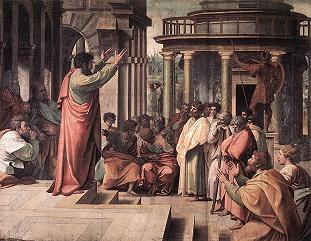
The Three Epistles

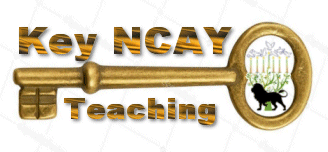
Continued from Part 2
The Johannine Writings are 'Different'
Shabbat shalom and welcome back back to the third part of this study of the Johannine Community. We have, over the course of five quite lengthy teachings, identified clearly that there is something quite "different" about the writings of John compared to the other New Testament writers. And to most commentators the apostle remains something of an enigma.
Three Sets of New Testament Writings
There are, it may be said, three sets, bodies or collections of New Testament writings, two of which centre around two apostolic personalities and the third around a miscellany of six others, making a total of eight persons:
- (1) The Pauline Epistles, which tend to be the most distinctive because they are the most numerous;
- (2) The Johannine Writings (comprising his Gospel, three Epistles, and Apocalypse); and
- (3) The Remainder (Matthew, Mark and Luke - the Synoptists, with James, Jude and Peter).
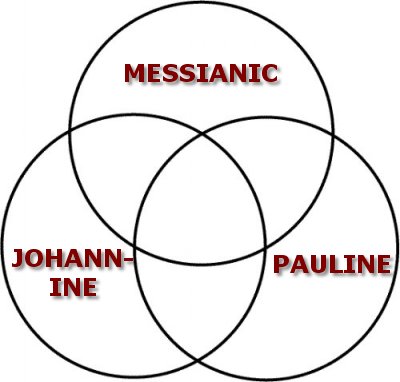
Preserved for Purpose
The Johannine writings so baffled the later post-apostolic fathers that they were nearly excluded from the Carthaginian (Protestant) canon which we use today [1]. And had they been excluded, a vital clue to the meaning of the Firstborn Besorah (Gospel) might have been irretrievably lost, with the Apostle's writings probably being lumped together with the various Gnostic and semi-Gnostic epigrapha. Yet the Ruach Elohim (Spirit of God) prevailed, even at that dark proto-Catholic time, and the Johannine scriptures have been handed down to us, awaiting an age in which they might once again be properly interpreted and understood.
Mystery & Concealment
Were we to sum up the Johannine writings, we might perhaps be justified in using two descriptive words which convey something of their essence: mystery and concealment, to the extent that the Apostle almost rubs it in, taunting the willfully unspiritual and hinting to those who desire to go deeper, in which well they may plunge their buckets to find the refreshing waters of the firstborn. Today I want to principally delve into the three short Johannine Epistles or Letters which are probably the youngest of the New Testament writings, being the last to be penned, probably at the end of the first century or the beginning of the second. As such they leave us the last authentic record of what the New Testament Community (Church) was like before the apostles were all removed and a new generation of leaders succeeded them. Thus were we to arrange the Bible chronologically then without a doubt the Third Epistle would conclude the volume that we call 'The Bible'.
 John's letters are a concealed mystery
John's letters are a concealed mystery
Enigma of the Third Epistle
What is remarkable about the Third Epistle is that is contains no theology at all. It is entirely personal and circumstantial. It is raw history. And though one might be tempted to think that it will readily yield itself, therefore, to an easy interpretation because of its lack of complex Johannine theology, we shall, I'm afraid, be disappointed if that is our expectation. This brief, oblique and enigmatic epistle, one of the shortest writings in the Bible, nevertheless holds some vital clues as to the nature of the Johannine School of Thought that we are so anxious to discover more about, and which lies at the heart of this Messianic Evangelical work we are engaged in. In this regard the Third Epistle will most certainly not disappoint us.
Breaking the Third Person Narrative Style
One unusual feature of John is that from time to time he addresses us directly, departing momentarily from his third-person narrative style:
"And this is the talmid (disciple) who bears witness of these things, and wrote these things: and we know that his witness is true" (Jn.21:24).
 John & Paul loom larger than life as the two main apostolic witnesses
John & Paul loom larger than life as the two main apostolic witnesses
Keeping Name and Identity in the Background
And if, as we are suggesting, his writings are also directed towards the believers of the end-time, then this may very well have been his intention, for the Apostle was, unlike all the other apostles, also a Navi (Prophet), Chozeh (Seer) and Gelah (Revelator, Revealer). He most certainly keeps his name and identity in the background, referring to himself only as the "beloved talmid (disciple)" (Jn.21:20) - indeed, sometimes he appears to be a mere symbolic figure, perhaps even a collective one, representing more than just an apostle. No doubt this is deliberate on his part.
The Community is Rent by a Schism
By the time we come to John's First Epistle it is clear that the General Assembly of Yahweh (Church of God) is in schism (1 Jn.2:19ff) and that the cause of this schism is doctrinal (1 Jn.2:23; 4:2). Worse, there are now two firmly established but competing Christian/Messianic Bodies with much controversy existing between them (1 Jn.2:26; 3:7), and it seems clear that in some way the Johannine Community (Church) has excommunicated the other one. The split is irrepairable. And if we make our way to the Book of Revelation, and to the controversy at Ephesus, it is clear that at least one possible cause of the split is over apostolic authority. False apostles had entered the Community (Church) whom the Johannine believers exposed, and for which they are commended by Yahweh (Rev.2:2). The apostates and their followers had departed from the Community (Church) physically though, as John tells us, they were never really a part of it spiritually. That the Johannine (Ephesian) Assembly (Church), which was the pre-eminent Assembly (Church) (as we saw in Part II), had a formal, inflexible organisational structure by the end of the first century is strongly suggested. The lines of authority seem to now be clearly demarcated and the rule for the Messianic Community (Church), and yet in his Third Epistle the opposite seems to be true - Diotrephes, a renegade pastor of an unnamed congregation, is not recognising apostolic authority and is continuing to lead with impunity; moreover, he is excommunicating the Johannine followers from his own congregation (3 Jn.1:9ff). And the fact that Diotrephes is able to do this suggests that the true followers are now in the minority. Could this, in part, be why the Apostle wrote:
"Do not marvel, brethren, if the world hates you?" (1 Jn.3:13, NASB)
The True Believers in a Minority by the Second Century
Does John therefore feel isolated by the larger apostate group? Whatever transpired, there seems little doubt that by the millennium shift in the year AD 100 there was already a formal and permanent separation of Christians/Messianics. Maybe no more than half a century after the resurrection of Christ the true Body of Messiah finds itself in a minority. It has already become a remnant.
The Majority Faction is Antichrist
This is no minor squabble over doctrine. The teaching of the apostates is so bad that John describes them as "antichrists" and marks their doctrine as idolatrous (1 Jn.2:18; 5:21). We have reached the point where the true doctrine of the emunah (faith) is clearly delineated and can no longer tolerate diversity, because the aberrant teachings are threatening the foundation of the Besorah's (Gospel's) defining emet (truth). The kinds of efforts made by the apostle Paul to keep dissidents in the fellowship are now no longer possible because the dissidents aren't true believers any more ... assuming they ever were (1 Jn.2:19). They have crossed their 'Rubicon' and now, unrepentantly, openly flout their iniquity. They'll not be turning back because Satan has achieved his goal - the creation of a rival denomination, a process that will occur again and again over the next two millennia, ever making for more spiritual chaos.
 The larger faction is by now antichrist
The larger faction is by now antichrist
Only the Minority Had the Anointing
The difference between the true and false bodies is not, moreover, merely a doctrinal one, but arguably something much more important - the true believers have something the false ones do not:
"But you (the true believers) have an anointing [unction - Amplified Version] from the Qadosh (Holy, Set-Apart) One, and you all know" (1 Jn.2:20; NASB).
What anointing? And what do the Johannine believers "know" which nobody else seems to? Note John does not include an object in the last sentence. They simple "know". Please carefully and deliberately note that there is a difference between 'having knowledge' and 'knowing'. Having 'knowledge', or a 'data base' if you like, is objective. 'Knowing' is a state of being.
Key to the Mystery of the Johannine Community
Here is the main key to the mystery of the Johannine Community (Church). The followers of John had received an "anointing" or an "unction" - an anointing, outwardly symbolised with oil in a sacred ceremony (much as baptism symbolises an a priori inner immersion of the Ruach/Spirit), a tradition (somewhat modified) still practised by the Roman Catholic and Eastern Orthodox Churches as a memory of a distant reality long since lost. This passage literally translates, "you have an anointing" - it is not just something that has just been 'given' or 'received' in the past but continues to be 'given' and 'received' into the present. It is the basis of their always 'knowing'. Or as Messianic Jewish scholar David H. Stern points out, this passage could, from the context, be translated as "you have been messiah-ed" or "christ-ed" with a lower case 'm' and a lower case 'c'. In other words, they have become elohim with a lower case 'e' as we've already talked about earlier in some depth in this series. (Also see, The Elect of Yahweh: Messiahs and Set-Apart Women).
The Johannine Chrism
Finally, the "Holy One" is the Father, Yahweh Himself. Thus this 'christing' or chrism as Messianic Evangelicals call it, a word and concept that still survives in the Eastern Orthodox tradition, is an anointing directly from Yahweh-Elohim Himself. It is the inner reality of what outwardly and symbolically we call Bar-Mitzvah or what the orthodox churches came to call 'confirmation'. And it is this chrism which confers upon the Johannine believers the ability to know the emet (truth). Without it there is no proper discernment of the emet (truth) and any outward ordinances then become meaningless, fossilised relics of of once vital spiritual realities. Without it reality of the inner transformative process (or worse, a demonic counterfeit spirit), false apostles can arise and believe they are teaching the emet (truth), but not know that they are not. In short, this anointing separated out the symbolic, counterfeit Christians/Messianics from those who are truly the sons and daughters of Yahweh, and it does so by blood and not because of some non-spiritual, carnal, psychic 'charismatic impartation' (one of the great deceptions of our modern age) as hopefully you will start to understand as we proceed.

The Blood Connection & the Firstborn
This, brethren and sisters, is the crux of all we stand for, in a way, because we are actually observing in the first century the way in which Messiah separated the wheat from the tares! The responsibility of the Johannine Community (Church) was to make this separation in order to maintain the purity and holiness of the true anointing. Failure to do this results, quite literally, in the drowning out of this Johannine anointing. Maintaining this separation or set-apartness (= holiness) is the responsibility of the Firstborn Assembly, of which John is head. Maintaining purity is VITAL and this is achieved, in part, by the proper, careful administration of the Master's (Lord's) Supper. This is the context of Paul's strictness in the matter of this sacred ordinance:
"Therefore, whoever eats the bread or drinks the cup of the Master in an unworthy manner will be guilty of sinning against the body and blood of the Master. A man ought to examine himself before he eats of the bread and drinks of the cup. For anyone who eats and drinks without recognising the body of the Master eats and drinks judgment on himself. That is why many among you are weak and sick, and a number of you have fallen asleep. But if we judged ourselves, we would not come under judgment. When we are judged by the Master, we are being disciplined so that we will not be condemned with the world" (1 Cor 11:27-32, NIV).
The Link to the Tree of Life & to Paradise Itself
The Johannine Community is "the community (church) of the firstborn, whose names are written in heaven" (Heb.12:23, NIV), and it is precicely a 'community' because it is quite literally in spiritual communion with Heaven. And it communes by virtue of the anointing. The majority faction is the counterfeit here - it is literally the antichrist beast system. I repeat: it is this anointing which enables the qodeshim (saints, set-apart ones) to finally overcome and to "eat of the Tree of Chayim (Life) which is in the Paradise of Elohim (God)" (Rev.2:7), a promise made initially only to the Ephesian believers - the Johannine qodeshim (saints, set-apart ones). It is therefore the means by which the qodeshim (saints, set-apart ones) acquire a blood connection directly to Elohim (God) the Father through Christ and the means by which they are finally and completely redeemed. They are the children of the first resurrection. They are the advance guard of the Holy City presently in the world. They live, and are, the Eden-Astara Principle which is the Way of the Holy Order and New Covenant Melchizedek Priesthood. If you can understand this you have understood much. With this key you can unlock everything that's going on around you in the world and in the churches.
Why Seven Congregations?
It is at this point that we must return to the Book of Revelation and understand why there are seven different Assemblies (Churches). You will have noticed that each of the seven assemblies (churches) of Asia Minor have different "overcomings" to work through and that each is given a different reward. The Johannine believers are given, as we have seen, the privilege of eating from the Tree of Chayim (Life) in Paradise, by which they are made possessors of eternal chayim (life). Not so the other congregations. Knowing why is rather important, don't you think?
 7 congregations representing 7 overcomings
7 congregations representing 7 overcomings
Different Tests, Different Blessings - the Smyrneans
Now, of course, there were many other Christian/Messianic congregations in Asia Minor with their own unique human mixes, deeds, blessings and judgments - they're mentioned either in the New Testament or are well known from the post-apostolic period like the congregations at Colossai (ref. Paul's letter to the Colossians) and Magnesia, respectively - so why has John singled out seven in particular? Because these seven represent, broadly-speaking, the seven different prophetic classes or categories of Christians/Messianics, each of which have different tests and different blessings depending where they are in their sanctification. You already know that Yahweh-Elohim, the Qadosh (Holy, Set-Apart) One of Israel, has seven Ruachot (Spirits) (Rev.3:1), and that each "Ruach (Spirit)" has the authority to confer different blessings to the overcomers of the seven groups as well as to impart seven particular blessings associated with the seven Annual Festivals not to mention the during the two festivals that themselves are each spread out over seven days, namely Pesach (Passover) and Sukkot (Tabernacles) during which blessings are imparted.
Different Tests, Different Blessings - the Other Five
And so the Smyrnean believers must undergo terrible trials and persecution even to martyrdom as part of their overcoming of besetting sins and for witness. What is their overcoming blessing? They will not be hurt by the second death (Rev.2:8-11). The overcoming Pergamonites, beset with sexual and other problems, are given some of the hidden manna and a white stone with a new name on it (Rev.2:13-17). The overcoming Thyratirans, beset with problems like feminism, are promised government of the nations in the millennium (Rev.2:18-29). The overcoming Sardisians, who keep pure, will be clothed in white garments and have their names recorded in the Sepher Chayim or Book of Life (Rev.3:1-6). The overcoming Philadelphians will become pillars in the temple of Yahweh, and will have His Name, the Name of the Qadosh (Holy, Set-Apart) City, and a new name, written upon them (Rev.3:7-13). And finally, the overcoming lukewarm Laodicians will sit down with Messiah on His throne (Rev.3:14-22).
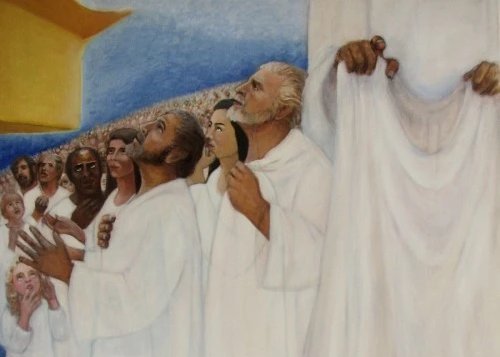 The overcomers who keep pure will receive white garments
The overcomers who keep pure will receive white garments
The Seven Assemblies & the Divine Tavnith
All these seven congregations are in fellowship with one another, all being under the government of the Ephesian Community (Church) which is the Mother or Metropolitan Congregation (Church) of them all. In fact the seven assemblies (churches) represent the seven overcomings that all true believers must successfully navigate. The key to the divine tavnith (pattern) of these overcomings, as I have already said, is to be found in the Seven Annual Festivals of Messianic Israel. All seven congregations have problems - in some cases, major problems - but all overcome through emunah (faith) in Messiah and bring forth those works that clearly evidence such overcoming which all may see. We may therefore say that all true believers must pass through a sevenfold overcoming to inherit the fullness of the sevenfold firstborn blessing.
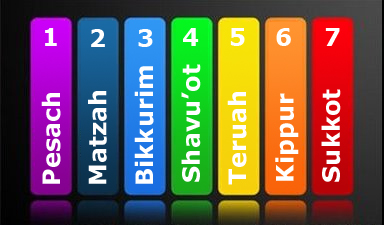 The 7 annual festivals correspond to the 7 overcomings
The 7 annual festivals correspond to the 7 overcomings
These seven blessings may also be represented by the seven arms of the Hebrew Menorah or Candelabra, the central or vertical arm or stem being the blessing of the Ephesian (Johannine) Community (Church) corresponding to the Feast of Sukkot (Tabernacles), which is the right to partake of the fruit of the Tree of Eternal Chayim (Life) which is obtained by the qodeshim (saints, set-apart ones) who have received the special anointing or chrism that gives them the power of discernment between the emet (truth) and error...which is the Pauline Agapé Love Feast which is the Johannine Marriage Supper of the Lamb! They're the same sacred meal.
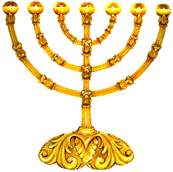
The Chosen Lady
Now we could spend considerable time examining these matters which we we cannot do today. However, we have done so elsewhere. Suffice to say that the heart of our understanding of the Seven Assemblies (Churches) of Asia Minor and of the special place of John as presiding Patriarch of the Messianic Community (Church) as a whole in New Testament times lies in this Chrism or anointing, shown by the fact that he is a visiting Elder at the assembly (church) in his Second Epistle, a community in which he does not personally live but for whom he has especial responsibility and oversight. Alternatively, this is not a congregation at all, the "chosen lady" being either the virgin Mary or perhaps Mary Magdalene as discussed in the four segments of Part II. If this is the correct interpretation, then "your chosen sister" in v.13 might well either be Mary or Martha, the sisters of Lazarus too - otherwise, it is another Johannine congregation. Apostasy is again rife, there being many deceivers, this time specifically the Gnostics who denied that Yah'shua (Jesus) had come in the flesh (2 Jn.1:7). So basically, those who are either hostile (worst case scenario), or unenthusiastic, neutral or 'agnostic' about the way of life of the Holy City have either not received the Johannine anointing at all (and have received a counterfeit spirit) or they have only received it in part and are in need of further instruction and spiritual maturation. The former can never enter the Order and the latter need more time to determine if, and when, they are ready for to.
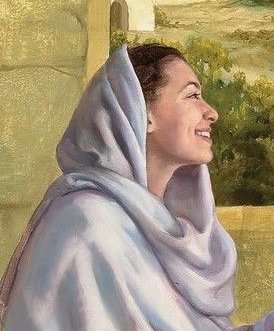 The 'chosen lady' may have been the mother of Yah'shua
The 'chosen lady' may have been the mother of Yah'shua
Fate of the Early Johannine Communities
You should note that the apostle Paul, who was beheaded in AD 68, has been dead for 20 to 40 years at the time of the writing of the Johannine Epistles. The controversies of his day, such as we find in the Corinthian Assembly (Church), are past. His Apostolic See has passed to one or more other apostles or bishops. We learn from Clement of Rome (ca. AD 98) that the Corinthian congregation went through a golden age - possibly immediately after Paul's death - to then descend into chaos following a coup d' état by younger members of the community, possibly during the latter Johannine period. If, as scholars believe, John wrote the Book of Revelation about AD 95, then the Corinthian Community (Church) was in apostasy like every other Christian/Messianic community except the seven struggling congregations in Asia Minor. Yes, the evidence would indeed suggest that the true and faithful Community (Church) was in a small minority at about this time. What the fate of the Johannine messianic communities (churches) was after the Apostle's death is hard to say - certainly the tradition of Chrism later passed into Eastern Orthodoxy and to some extent into Catholicism though without the miraculous side-effects, suggesting that its authority and power disappeared sometime shortly after John's death.
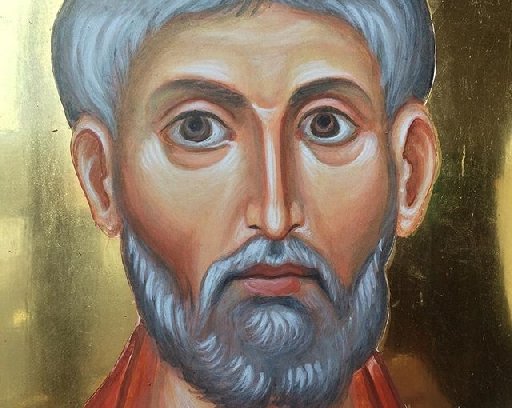 Clement of Rome tells the history of the Corinthian saints
Clement of Rome tells the history of the Corinthian saints
Patriarchs, Elders & Laity
Let us search the Epistles for more clues, for there are many. We have mentioned that John was called "the elder" in 2 John 1:1 (NASB) which renders the Greek presbuteroi from which we get the word "presbyter" or "elder". (The Presbyterians call themselves by that name because the highest office in their denomination is the Elder). Curiously, though, John does not refer to the Community (Church) leadership in 1 John 2 as "elders" but as "fathers" or patriarchs. He speaks only of "fathers" (patriarchs), "young men" and "children". The "fathers" (patriarchs) know Elohim (God) personally; the "young men" are strong because the Davar Elohim (Word of God) abides in them and they have overcome the evil one (v.14). These "young men" are spiritually mature believers - overcomers - their "youth" is only in comparison to the "fathers" or Patriarchs and they are most likely Elders. It is the "children" (lay members) who are having the problems - they are sinning, but because they are repenting and struggling to overcome, "your sins are forgiven you for His name's sake" (v.12, NASB). We cannot be certain to which congregation John is writing in any of his Epistles but it seems likely either be to Ephesus while he is on his travels or one of Ephesus' daughter colonies, perhaps one of the other six in Asia Minor.
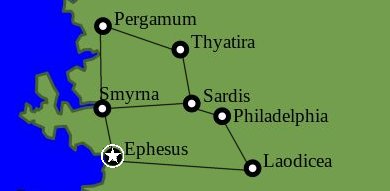 The seven Johannine congregations of Asia Minor
The seven Johannine congregations of Asia Minor
The Anointing That Teaches
Now the second Epistle stresses eternal life a great deal (v.25), which is the theme of the blessing of the Ephesian qodeshim (saints, set-apart ones) (Rev.2:7). He speaks of the "anointing" again which confers a very special gift on those who have received it:
"And as for you, the anointing which you received from Him abides in you, and you have no need for anyone to teach you; but as His anointing teaches you about all things, and is true and is not a lie, and just as it has taught you, [so] you abide in Him" (v.27, NASB).
The Third Rebellion
The navi (prophet) Jeremiah foresaw a time when Yahweh's people would not need teachers any more for all would know the Davar Elohim (Word of God) (Jer.31:34). It was this passage which led to the Third Rebellion in our own early NCAY congregations when a group of members presumed that they no longer had need of teachers because they were "born again". But that is the whole point - this anointing is not the "new birth" but spirit behind the ordinance of Chrism, about which I have yet to speak. The rebels soon discovered how divided they were amongst themselves and that they were sorely in need of teachers to correct them, but their stubborn pride forbade them from confessing their error. They are not alone - thousands of Christians and Messianics today are claiming to have received this "anointing" and yet their works glaringly betray an almost complete absence of it.
The Boastful Apostates
Let us be clear, then, that the "fathers" (Patriarchs) and "young men" (Elders) in the Johannine Community (Church) had received an anointing which enabled them to always clearly know the difference between emet (truth) and error. They were by no means deceived by the impostors and false apostles. The Davar Elohim (Word of God) abided in them, they were strong, and they had overcome Satan. That means, to put it another way, that they were no longer yielding themselves to habitual sin. They were overcomers. Yet there were apostates amongst them, in all likelihood Gnostics of some sort, who were claiming the perfection these Patriarchs had acquired but did not possess it. As a result they hated, and were jealous of, their brethren. John painstakingly points out that those who abide in Messiah do not hate their brothers, and if they do, then it is testimony that they are not in Messiah (1 Jn.2:9,11; 3:13; 4:20). The Gnostics (which means "they who "know", from the Greek, gnosis, meaning "knowledge"), like today's legalists amongst both messianics (boasting of the Torah knowledge) and evangelicals (boasting of their Bible knowledge), were saying, "I have come to know Him (God)" as the Patriarchs truly had, when they had not (1 Jn.2:4) for they had not received the anointing or had otherwise lost it through prostituting the Besorah (Gospel). And the evidence that they did not have the anointing - or had lost it - was the fact that they had stopped loving one another.
Open Rebellion
Now you will remember that this was the rebuke that the Master gave the Ephesian Assembly (Church) in Revelation 2. The Ephesians as a community, He said, had everything except one thing -"you have left your first love" (Rev.2:4, NASB). The knowledge this anointing had given them had gone to their heads and they, like Satan before them, were unseated by pride, and it was not long before they were exalting this knowledge above personal humility and ahavah (love). In short, they fell, just as Lucifer and one third of the heavenly host fell in the beginning. They had incredible knowledge and power but they became boastful - they too "left their first love". And that led to open rebellion. The Master says to these rebels:
"Remember therefore from where you have fallen, and repent and do the deeds you did at first; or else I am coming to you, and will remove your lampstand out of its place - unless you repent" (v.5).
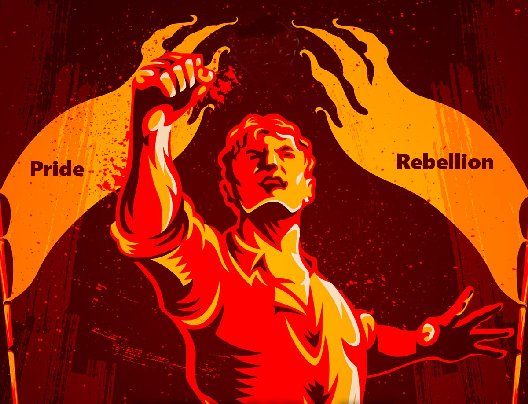
When the Proud Cease to Love
Can you now see the clear parallel between the fruit of this anointing and the condition of the malakim (angels) before the Great Rebellion? The Johannine qodeshim (saints, set-apart ones) who had partaken of this anointing were now partaking of the Seven Ruachot (Spirits) of Yahweh as the faithful malakim (angels) do! But some of them had fallen because of pride and had ceased loving the brethren. They exalted themselves because of their superior knowledge and in the process became fools because they lost the key of chayim (life) itself, which separates Elohim's (God's) people from the devil's - and that key is sacrificial AHAVAH/CHESED (LOVE).
Return to Love
So the mitzvah (command) went out to them to make teshuvah (repent) and to do the deeds they had done at first - in other words, manifesting true Messiah-like ahavah and chesed (loving kindness and mercy) through service. From this we learn that Chrism does not confer any sort of immortality - it is not a magical elixir like the one pursued by the mediæval 'Holy Grail' hunters - but it does bless the recipient in a special way provided he remains in sacrificial ahavah/chesed/agapé love. It does not make anyone immune from pride, does not prevent someone from falling - it does not confer or guarantee that fantasy condition invented by Calvinists known as "once saved, always saved"! Their lampstand - which is their place in heaven - will be removed, in other words, they will no longer be numbered among the saved.
Once Saved, Always Saved?
You see, a group of qadoshim (saints, set-apart ones) believed, as the devil and his malakim (angles) did, that no longer being in need of teaching meant that they were somehow no longer in need of Elohim (God) - "once saved, always saved"; that error which afflicts a huge segment of the evangelical Christian movement today - and they became proud. Some of the proudest and most unteachable Christians I know of are those who claim to be "once saved, always saved". And though they may not necessarily be Gnostics in any denominational sense, they are without a doubt possessed by that same devilish spirit the ancients were 2,000 years ago.
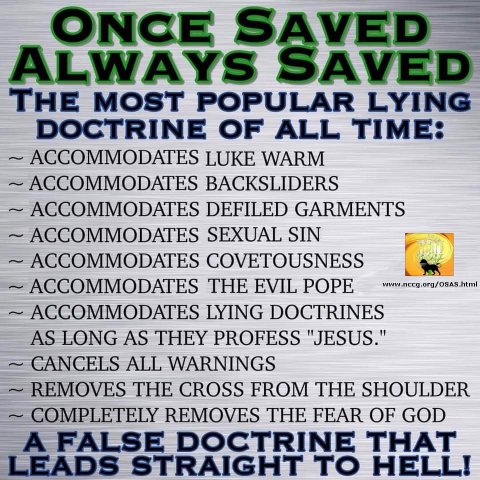
Righteousness Must Be Practiced
John and the faithful Patriarchs and Elders knew this very well. And so John wrote:
"And now, little children, abide in Him, so that when He appears, we may have confidence and not shrink away from Him in shame at His coming. If you know that He (Messiah) is righteous, you know that everyone also who practices righteousness is born of Him" (1 Jn.3:28-29, NASB).
What does John mean by 'practice' righteousness? This is the actual application of an idea, belief, or method, as opposed to the theories or doctrines relating to it. This is the customary, habitual or expected procedure, or way of the doing of something. It's what one lives out outwardly in the world. In other words, it is one of those 'works' or 'deeds' that James speaks of as necessary proof of authentic emunah (faith) (Jas.2:20,26). It's something you choose to do by an act of will. It doesn't come automatically without action. It is a fruit of proactive trusting. It's what you do because you have what the Bible calls 'faith'.
A Synthesis of Paul and James
John is, as I have said before, a teacher of the synthesis of the whole Besorah (Gospel). To be truly born of Messiah is to practice righteousness - it is not passive belief, but active emunah (faith) manifest in works - faith-in-action. John brings Paul and James together, showing the true relationship between emunah (faith) and works or deeds. We are not immune from falling - there is no eternal security if we take our eyes off Christ and fail to secure it by responding to the gift in active righteousness. So how can we know if someone is truly born again? As John himself says, you will see it in their works of righteousness. And how will you know if they have received the anointing of which John speaks? They will know Yahweh personally, be strong, the Davar Elohim (Word of God) will abide in them, and they will have overcome the evil one, no longer habitually sinning (1 Jn.2:14) - no longer customary, constant or continual sinning.
A Two-Stage Salvational Process
We see at this point that John teaches at least a two-stage salvational process marked by two visible events. First, there is the new birth which is marked outwardly by water baptism; and Last, there is a completion event marked by a special anointing or Chrism which indicates that the believer has truly overcome.
"For whatever is born of Elohim (God) overcomes the world; and this is the victory that has overcome the world - our emunah (faith)" (1 Jn.5:4).
The Sacred Meals of Messiah
There is therefore an Alef and a Taw, an Alpha and Omega, an 'A' and a 'Z', a Beginning and an End, salvation that correspond to the first and last annual festivals of Pesach (Passover) and Sukkot (Tabernacles), each of which has its own sacred meal - the Passover Meal and the Marriage Supper of the Lamb, respectively, with their regular weekly or monthly symbolic re-enactments, the Master's (Lord's) Supper, Communion or Eucharist - "he who endures to the end shall be saved" (Mark 13:13, NKJV).
Identifying the True Overcomers
A person who is truly born again and is not just saying he is (a symbolic or nominal Christian) but is overcoming the world and its lusts by those increments that are described in the Book of Revelation as encompassing seven areas with seven special giftings, is the true overcomer. An overcoming Christian/Messianic is one "who really believes that Yah'shua (Jesus) is the Son of Elohim (God)" (1 Jn.5:5) and demonstrates it by exercising "emunah (proactive faith)" (v.4) by non-egotistically, spontaneously producing righteous deeds that draw attention not to self but to Christ, bringing Christ glory, not self. The true overcomer is not self-conscious but Messiah-conscious and not therefore at all worried about his final status in the eternities. The only thing that occupies him is ensuring He belongs to Christ fully by submitting to Him daily.
By Water and Blood
How is this done? In the same way that Yah'shua (Jesus) did "by water and blood" (v.6). And note:
"Not with mayim (water) only, but with the mayim (water) and with the dahm (blood)" (v.6, NASB).
The Third Witness of the Ruach haQodesh
Do you see the two elements here? With mayim (water) - the sign of baptism indicating the New Birth or the Alef or Alpha of salvation, and with dahm (blood) - which is faith in the shed blood for sin at Calvary and reception of the mysterious "anointing" which indicates the completion or the Taw or Omega of salvation. And there is a third witnessing agent - the Ruach (Spirit) - which is the final seal, for:
"It is the Ruach (Spirit) who bears witness, because the Ruach (Spirit) is the emet (truth)" (v.7).
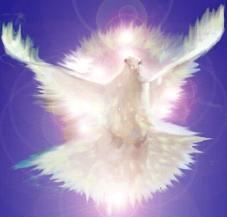 The Ruach is the third witness
The Ruach is the third witness
The Three are in Agreement
It is the Ruach (Spirit) which seals a soul as a born-again son or daughter through baptism, and it is the Ruach (Spirit) which seals a born-again soul through the anointing or unction of the dahm (blood) which was released by Messiah. Together the three are one:
"For there are three that bear witness, the Ruach (Spirit) and the mayim (water) and the dahm (blood); and the three are echad (one, in agreement)" (v.8).
All three witnesses must be present, like the three legs of a stool. They testify of each other because they depend on each other. A stool with only one or two legs cannot stand.
The Threefold Demonstration That is Bearing True Witness
Those who receive these bear witness that:
"Elohim (God) has given us eternal chayim (life), and this chayim (life) is in the Son. He who has the Son has the chayim (life); he who does not have the Son of Elohim (God) does not have the chayim (life)" (vv.11-12).
To Know That You Have Eternal Life
Now let us be perfectly clear:
"These things I have written to you who believe in the name of the Son of Elohim (God), in order that you may know that you have eternal chayim (life)" (v.13).
Who are these people? These are they who have been born again through emunah (proactive faith) in Messiah and who have received the anointing/unction/Chrism - they know (they don't just believe in a doctrinal proposition in their heads) - they know they have eternal chayim life provided they do not forget their first love and resist exalting themselves in pride and falling away, as the apostates did in John's Epistles. Lucifer and the demons also possessed this eternal chayim (life) but they forfeited it by rebellion - and look at them today!
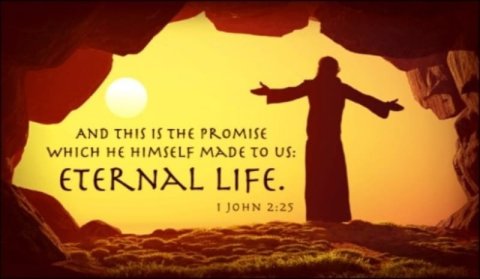
They Do Not Deliberately and Knowingly Sin
So we must be careful.
"We know [absolutely] that anyone born of Elohim (God) does not [deliberately and knowingly] practice committing sin, but the One Who was begotten of Elohim (God) carefully watches over and protects him - Messiah's divine presence within him preserves him against the evil - and the wicked one does not lay hold (get a grip) on him or touch [him]" (1 Jn.5:18, Amplified V.).
False Teachings About Salvation and Sinning
There is a war on in Christendom today with a lot of false doctrine being spouted. Some are saying they don't sin at all (misreading the passage above). Others say that they cannot ever fall and that they're guaranteed a place in heaven no matter what they subsequently do because of the first saving act in their lives (OSAS). Others teach that God predestined them to salvation, that they didn't choose it themselves and that they can't possibly fail, no matter how much they sin, because they are going to make it no matter what (Calvinism). Others who do believe in free choice (many Provisionists and Arminians) say that you only have to believe and you are automatically a fully sanctified, overcoming Christian/Messianic.
Behaviour of the Fully Saved Person
All these are pernicious heresies. One who is fully saved still sins inadvertanly but never habitually and wilfully; everyone can fall, and many do; and passive belief is not enough - true belief always leads to good works - works of righteousness, even as Messiah is righteous.
Valentinian Gnosticism & Mormonism
Then there are other heretics who make the Besorah (Gospel) so hard that nobody can ever be saved. For them, the fruits of salvation are the saving works themselves - thus a person must perfect himself in deeds before being finally 'saved'. This also is false. The Valentinian Gnostics believed in this, the descendants of the Gnostics John was rebuking in his Epistles. This belief is similar to that of the Mormons who teach that you are saved by grace only 'after all you can do' (2 Nephi 25:23). So such a person can never know if he is saved or not in this life. He has no assurance or security.
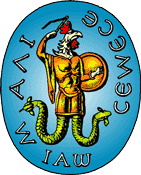 John rebuked gnostics
John rebuked gnostics
The Problem of the Comma Johanneum
As a footnote to all these observations I need to draw your attention to a deliberate insertion by Catholics into the Byzantine Texts that form the basis of the King James Version (KJV). Erasmus' Textus Receptus reads:
"For there are three that bear witness in heaven, the Father, the Davar (Word), and the Ruach haQodesh (Holy Spirit), and these three are echad (one). And there are three that bear witness in earth." (1 Jn.5:7-8a, KJV).
This text concerning the heavenly witnesses is not, however, contained in any Aramaic or Syriac manuscript or any Greek manuscript which was written earlier than the 15th century. It is not cited by any of the Greek ecclesiastical writers, nor by any of the early Latin fathers, even when the subjects upon which they treat would naturally have led them to appeal to its authority. It is therefore evidently spurious and was first cited (though not as it now reads) by Vigilius Tapsensis, a Latin writer of no credit, in the latter end of the 5th century [2]. It is obvious that these verses were forged in order to bolster the emergent Trinity doctrine and are therefore rightly omitted from all modern versions. The interpolation is completely disjunctive with John's theme and has the effect of deflecting the reader away from understanding the importance of the Johannine anointing. [3]
Conclusion
We have, I hope, now clearly established that there is a link between the "anointing" and the Blood of Messiah, but what is that link? That is the subject of next week's study which will bring us to the end of this series. Until then, may our Father Yahweh keep you and bless you in Yah'shua the Messiah (Jesus Christ). Amen
Endnotes
[1] On 28 August 397 (confirmed in 419) a Council of Carthage issued a canon of the Holy Scriptures which is the one the Protestant tradition uses today
[2] Vigilius of Thapsus, also known as Vigilius Afer and Vergil of Tapsco, was a 5th century Bishop of Thapsus in the province of Byzantium in what is now Tunisia, as well as a theological writer and polemicist. After the synod of 484, he was banished by the Vandal King Huneric who supported Arianism, for his Trinitarian beliefs, along with other Catholics.
[3] For other Bible insertions or changes, see Have the Original the Bible
Manuscripts Been Edited?
Continued in Part 4

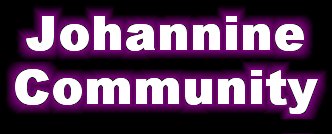

 V469
V469

This page was created on 24 January 2001
Last updated on 22 May 2024
Endnotes Copyright © 1987-2024 NCAY - All Rights Reserved


|


